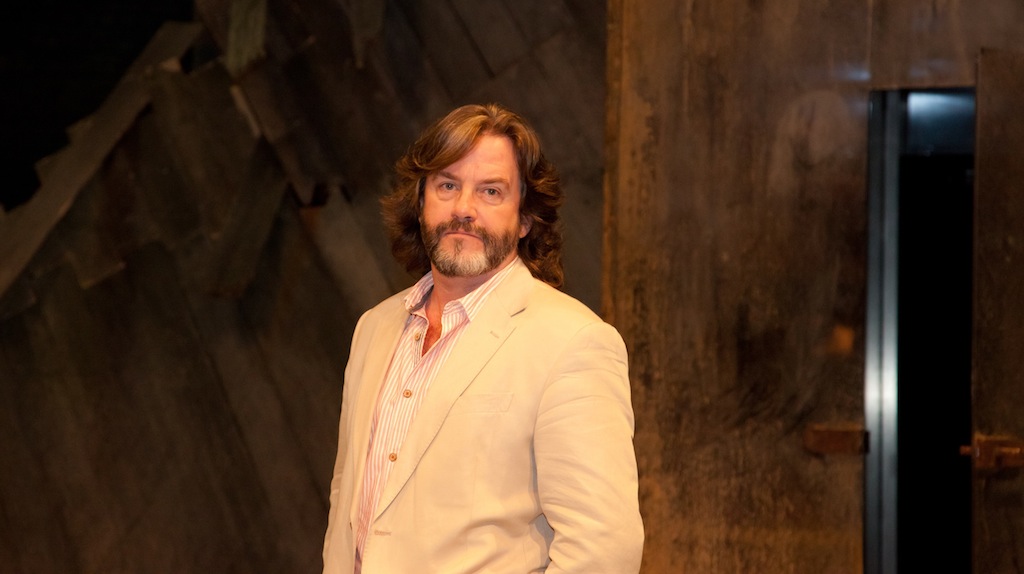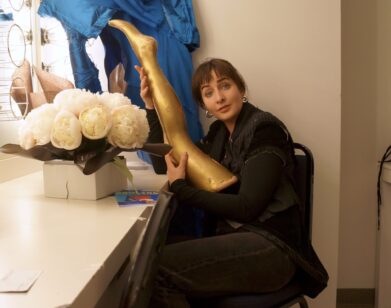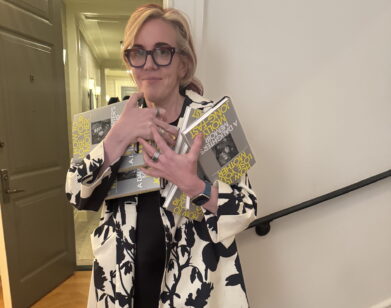Shakespeare’s African Play

ABOVE: GREGORY DORAN. PHOTO COURTESY OF GINA PRINT
Mark Antony strolls across the stage in a white tracksuit with a gold chain around his neck. When he speaks, he rolls his “r”s, drawing out each repetition of “for Brutus is an honorable man” during his later “Friends, Romans, Countrymen” eulogy.
In the Royal Shakespeare Company’s current production of Julius Caesar, Antony is not in Rome, but in contemporary East Africa. Caesar is a dictator who rose to power via a bloody civil war; his rule is ruthless and comforting, stable but brutal. “Once you get rid of the togas and the sandals, you see what Shakespeare was doing,” explains director Gregory Doran. “He was writing something really, really acute about politics.”
The idea for Doran’s Africa-set production began over a decade ago, when Doran met Nelson Mandela in London and Mandela quoted Caesar’s line: “Cowards die many times before their deaths; the valiant never taste of death but once.” After a successful run in Stratford and London, Julius Caesar is on a world tour and Doran has been named the new Artistic Director of the RSC. The play’s first stop in the US is the Brooklyn Academy of Music’s Harvey Theatre. We sat down with Doran in the theater lobby after tech rehearsals to discuss Mandela, Caesar’s relevance to African politics, and how Doran came to devote the past 25 years of his life to a deceased playwright.
EMMA BROWN: When did you meet Mandela?
GREGORY DORAN: It was shortly after the ending of apartheid. My partner Antony Sher and I had done quite a lot of work for the anti-Apartheid in the UK, because he’s South African. We were invited when Mandela came to London; he was doing a big event in Trafalgar Square. We had campaigned outside of South Africa House for all those years and for him suddenly to be there inside South Africa House as the new president of the new South Africa was a great moment. He came onto the balcony and we met him. I thought I was going to get all burbly and not be able to speak, [but] he put his hand on mine and we chatted. My whole metabolism went down—I think he realized by that point that so many people that had met him were overwhelmed by the extraordinary man that he is.
I discovered that he had this copy of Shakespeare on Robben Island. The book was owned by an ANC [African National Congress] inmate—a Hindu inmate—called Sonny Venkatrathnam. His wife had smuggled in the complete works for him, but she had torn up Diwali cards of Rama and Sita and the Hindu gods and made it look as though it was a prayer book. The guards would not have allowed literature through, but they would allow a prayer book. So Sonny had the Complete Works of Shakespeare protected by Rama and Sita, which is a rather beautiful idea. [Another ANC inmate] Walter Sisulu had underlined lines from Shylock in the Merchant of Venice: “For sufferance is the badge of all our tribe.” And another inmate had underlined Caliban’s lines from The Tempest: “This island’s mine, by Sycorax, my mother.” You get those two attitudes, one of tolerance and forbearance and endurance, and another of a more angry demand of basic rights. You get a whole history of apartheid. But Mandela had chosen these lines from Julius Caesar, and it made me look at the whole play in a different light.
Julius Nyerere, who was the first president of Tanzania, had translated Julius Caesar into Swahili. It had been translated way back in the 1920s, in South Africa, into one of their languages, Tswana, by Sol Plaatje, who was one of the founders of the ANC. Julius Caesar kept on reoccurring in the history of Shakespeare in Africa, and was the play that seemed to be the most done. I asked John Kani, who was in famous productions like Sizwe Banzi Is Dead, Woza Albert, and The Island, all coming out of South Africa, and he said, “It’s simple, Greg; it’s Shakespeare’s African play.” That really struck me. If you look at the history of Africa in the last 50 or 60 years since many of the countries gained independence from imperial rule, you get this history of leaders coming to power on a wave of popularity, beginning to gather all that power to themselves, then being overthrown in a military coup that plunges the country into civil war. That’s the plot of Julius Casear.
To begin with I thought: Here am I, a gay, middle-class white guy going, “Julius Caesar should be set in Africa.” I decided to get a group of friends, black actors in the UK and people that had worked in Africa, who knew Africa, together for a couple of days on a symposium to check the play and see whether it was a fit—whether it was resonant. And while that was happening, Arab Spring was happening. The big question in Libya was not, “Are they going to get rid of Colonel Gaddafi? Will they assassinate Colonel Gaddafi?” because that seemed inevitable. The big question was, “What happens next?” And that’s the big question in Julius Caesar. Too often, I’ve found that you follow the play through to the assassination of Caesar, and then it’s a kind of dying form. We all know that Caesar’s going to be assassinated, it’d be a pretty odd production of Julius Caesar that didn’t assassinate Caesar, but when his death comes, that shouldn’t be the end of the play. It should be: What on earth is going to happen now? Is Brutus a hero of republic or is a he a wishy-washy liberal that hasn’t thought things through?
The answer is that he’s both. Many productions take a point of view on Brutus and actually I think what’s Shakespeare’s doing is much subtler than that. [Brutus] puts things in an incredibly eloquent way, but the strategy behind it is completely wrong. Time after time after time, Brutus goes, “There is a tide in the affairs of men. Which, taken at the flood, leads on to fortune,” which sounds like a fantastic thing. You would follow that man, you would say, “Yes, we must seize the moment, we must do it now.” But the result of his plan to seize the moment and face Mark Antony at Phillippi is that he dies. We just became fascinated by how the play pitches rhetoric against reality. Brutus is the one in the forum scene who sways the crowd with beautifully honed sound bites for the telly—he really knows how to speak to that crowd; he speaks in prose. Marc Antony, he says, “I’m no orator” and yet delivers this amazing speech all in verse and turns the crowd round in the most extraordinary. That’s both terrifying and funny at the same time. That’s what’s been, to us, a real revelation about the play. It’s constantly making you go, “Oh yeah, Brutus is right.” And then seeing Caesar and going, “Oh, no. This poor frail man, all he’s tried to do is pull his country out of a terrible hole, of course they mustn’t assassinate him.” Really what Brutus and Cassius do by assassinating Caesar, is open up a vacuum into which much more ruthless people run. It’s an amazingly contemporary, resonant, politically astute play.
BROWN: Many countries have that sort of history of a leader who tries to establish a cult of personality, followed by bloody power vacuum.
DORAN: The idea, I guess, is we are not saying, “Look, Shakespeare’s written a critique of modern Africa.” What we’re saying is that we’ve shifted the metaphor to make it more immediate.
BROWN: Had you directed Julius Caesar before?
DORAN: No, when I joined the RSC as an actor 25, 26 years ago, I played Octavius. I remember one wet Wednesday matinee, completely forgetting my lines, and realizing that maybe I was more cut out to be a director than an actor, so maybe Julius Caesar was a crucial play for me, in my career. It’s a play I’ve always admired but never loved until now. I didn’t realize how funny it was. It is very violent. The death of Cinna, the poet, was cut for about 100 years; nobody ever did the Cinna scene. It was only redone in the 1930s, I think. And yet, to me, it’s a crucial, key scene in the play, because you see how once violence is released in a crowd—in a mob, in a city—how it tips into all sorts of terrible things. The African continent has had a very violent history, because of its colonial past to some extent, so the violence doesn’t seem to be cheapened or exoticized as it can be in an ancient Roman context, when we’re expecting people to be thrown to lions and all that sort of stuff. In a modern context, that violence seems much more dangerous and much more terrifying, I think.
BROWN: Do you think Shakespeare is most effective when translated to a modern setting?
DORAN: I don’t. Sometimes the parallels that are brought in can make the play seem less relevant; you can deny a play’s application to the universal by making it too specific. Sometimes having a modern context does make things easier to grasp; sometimes, you go, “Why have they got swords?” “Why didn’t Juliet just text Romeo? Why did she bother posting a letter? Why was the Milan post service so bad?” It throws up irrelevant questions that don’t help. I have seen productions of Julius Caesar that set it in a modern, Western context and it just looks as though they’re getting rid of a particularly cantankerous chairman of the board rather than the great leader of the world.
BROWN: Did you read any other texts or did you only focus on Shakespeare’s original play? Did you go back to Plutarch or read any African literature?
DORAN: We did. We had at the symposium Tom Holland, who has written a number of books about, most especially, Rubicon. We looked at Plutarch and we looked at Parenti’s The Assassination of Julius Caesar to see what the different interpretations of that assassination were. Paterson Joseph [who plays Brutus] picked up a rather extraordinary fact that Shakespeare doesn’t allude to but we use, which is that Brutus, the final one to stab Caesar, stabs him in the genitals. He stabs him right between the legs. That seems so violent and so primal. I guess the one that thing that also the African context has no problem with at all: the whole sense of the spirit world and the soothsayer and lions walking around in the streets and terrible thunderstorms. Somehow the soothsayer is in touch with something that most of the population really believe in. They talk about the ancestors and that’s very much ancient Rome. It’s where ancient Rome and Africa meet. There’s a wonderful author named Can Themba, [who] said that Africa extends a fraternal handshake to Shakespeare. That Shakespeare would have recognized Elizabethan England more readily in Africa today than in England today.
BROWN: Are any of the people that you had reading in the symposium in the play?
DORAN: They are all in the play. People just kind of committed to it as an idea. It was the first time that the RSC has ever fielded an entirely black company. It’s 50 years, over just, 50 years since the first black actor ever appeared on Stratford. Edric Connor appeared as Gower in Pericles. I didn’t decide to do this because I wanted to get a group of black actors together.
BROWN: Do you feel more emotionally invested in this production than you usually do?
DORAN: I don’t know whether I do. I always feel emotionally engaged in productions. If I ever get to the point where I don’t feel emotionally engaged, maybe I should stop. I landed the job of artistic director while we are opening the play, so it will always be one to remember for more reasons than one. They’re hard to do, these plays. It’s hard, also, for a company like the RSC to not get into the treadmill of: “If it’s Tuesday, it must be As You Like It.” You have to make each play an event. Whether that’s star leading actors or the concept behind the production. It has been a good tester, or taster, of how the language works. In the East African accents we use, the language has a kind of richness to it, a kind of vitality. We deliberately didn’t do west African accents because they have quite a different kind of singing rhythm within that, very tonal kind of accent, which can almost be too rich for the text to bear. The East African accent has a precision to it, and a musicality to it, that lends itself to the iambic pentameter by happy coincidence. I have to say that I didn’t that about that much beforehand. The list of potential candidates for Julius Caesar is quite large. You could go, “Well, he’s a Caesar.” Idi Amin, or Bokassa in the Central African Empire, or in Zimbabwe, Robert Mugabe coming to power. They have all, at some point in their lives, been candidates for a casting as Julius Caesar.
BROWN: Do you have a favorite line from the play?
DORAN: At the assassination of Caesar when Cassius says, “How many ages hence shall this our lofty scene be acted over in states unborn and accents yet unknown!” And you kind of went, “Never was there a truer word spoken.” It could have been written particularly for this production.
BROWN: Do you think a play is better towards the end of the run?
DORAN: Sometimes it can get overburdened with nuance—the actors find all sorts of different spins on the lines that can lose simplicity and directness. They all become fond of their extra stresses and the audience are going, “Just give me the line simply, what did you mean?” You have to ward against that.
BROWN: Have audiences in different countries responded to it differently?
DORAN: The Moscow audience, they stood and cheered. I don’t know whether they thought there were parallels with Putin.
BROWN: I’m surprised you could perform it there.
DORAN: I know. I don’t think Putin goes to the theater enough to even deign to think there was any criticism intended. And there wasn’t. We were invited by Moscow. Maybe they wanted a particular production of Julius Caesar in order to remind Putin that he was vulnerable, [laughs] but that wasn’t our intention.
BROWN: What was your first interaction with Shakespeare?
DORAN: My father was part of a record club, and every now and again, box sets of Beethoven symphonies would arrive. With one box there was a little 45 record of incidental music for A Midsummer Night’s Dream, the Mendelssohn music, interspersed with extracts from the play. It was an American production and there was an actress, playing Puck, who sounded like Mickey Mouse. When she said, [does a squeaky voice] “I’ll put a girdle around the earth in 40 minutes,” I was amazed—the idea of Puck traveling around the Earth in 40 minutes was amazing to me. My dad, who was a scientist, I remember him telling me that Sputnik circled the globe in an hour in a half. And I thought, “Wow, Puck is twice as fast as Sputnik.” [Laughs]
Then I went to a Jesuit school and they did a Shakespeare play every year. I got to know Shakespeare as parts I wanted to play. I missed out on playing Ophelia—it was an all-boys school—Gags Ronson got Ophelia. The following year, the younger boys used to play the girls, I played Lady Anne in Richard III and Lady Macbeth, then Richard II and Malvolio. I just became a complete Shakespeare nut, really. By the time I came of age and, indeed, Mrs. Thatcher became prime minister, I had seen the entire canon, which, in those days, you were quite able to do. Now, it’s a much harder thing. Mrs. Thatcher was really axing public subsidy for the arts. What’s depressing, in a way, thinking of her legacy—and she was no doubt great in many ways—but the arts in the UK are still having to justify that it is a profitable business rather than a frivolity. It’s one of the greatest UK exports, one of the reasons people come to the UK, and yet we’re still having to justify our existence in terms of funding. I was doing an interview with Charlie Rose yesterday and he said, “What do you think about Mrs. Thatcher?”—and I had not heard she had died at this point—and he said, “Is there any kind of Shakespearian overtone here?” I said, “Well, actually, Julius Caesar, because ever if a politician was stabbed in the back, it was Mrs. Thatcher, by all her conspiratorial cabinet, which really did just stab her in the back.” It’s a rather interesting resonance.
BROWN: Is there a Shakespeare play that frightens you?
DORAN: King Lear frightens me. I’ve done nearly two-thirds of the plays for Stratford now; part of what I know I’m going to do over the next few years is hopefully complete the arc of the final third. I’ve never done King Lear, I guess partially because my father dwindled into dementia in his last years and King Lear is such an accurate portrayal of a father figure suffering from dementia—the play was almost intolerable for me. That’s the one I have to face up to. I think Shakespeare’s like a passport through your life: as a kid hearing about a play with fairies or witches or ghosts, you get excited by that possibility. Then later on you become interested in the psychology or the politics or the beauty of the language. You grow up with the plays. King Lear is one that I don’t feel grown up enough to do yet.
THE RSC’S PRODUCTION OF JULIUS CAESAR IS AT BAM THROUGH APRIL 28. FOR MORE INFORMATION, VISIT THE BAM WEBSITE.






